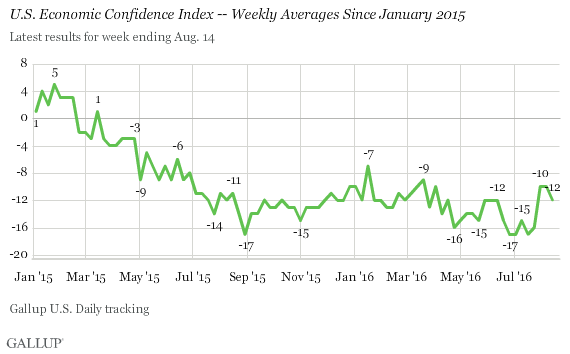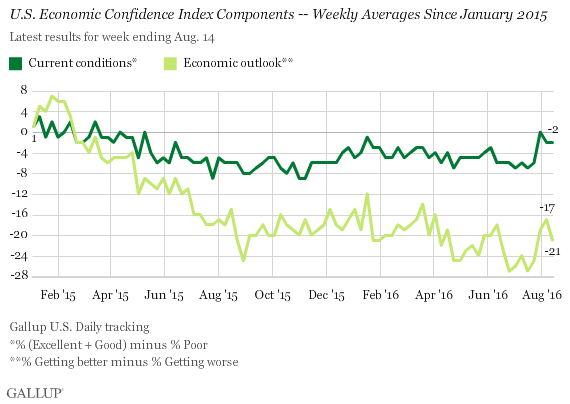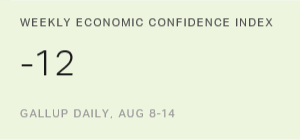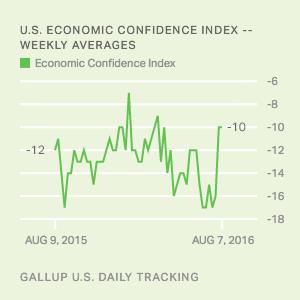Story Highlights
- Similar to -10 scores after Democratic convention
- Index had averaged -16 in weeks before convention
WASHINGTON, D.C. -- Americans' confidence in the economy remains higher than it was before the Democratic convention, with Gallup's U.S. Economic Confidence Index averaging -12 for the week ending Aug. 14. This score is similar to the -10 in its late July rally and in the first week of August, but above the -16 average for the six weeks leading up to the convention.

The index rose in late July because of the higher level of economic confidence that Democrats exhibited after the Democratic National Convention. By and large, Democrats have retained their higher confidence in the economy, which has kept the index stable for the last three weeks.
While Americans' confidence in recent weeks has been elevated relative to the previous few months, it remains well below the post-recession weekly average high of +5 recorded in January 2015. After reaching this high point, the index began a steady fall through much of 2015 before stabilizing in late August, where it has mainly remained since.
Last week, all three major U.S. stock indexes reached record highs on the same day, the first time this has happened since the booming 1990s. However, this failed to energize Americans' confidence in the economy. In fact, the index's rolling average for the first three days after this development was a bit lower (-13) than averages recorded earlier in the week.
Gallup's U.S. Economic Confidence Index is the average of two components: how Americans rate current economic conditions and whether they feel the economy is improving or getting worse. The index has a theoretical maximum of +100 if all Americans say the economy is doing well and improving, and a theoretical minimum of -100 if all Americans say the economy is doing poorly and getting worse.
The current conditions score averaged -2 last week, reflecting 27% of Americans saying current economic conditions are excellent or good and 29% saying they are poor. The economic outlook component averaged -21, reflecting 37% of Americans saying the economy is getting better and 58% saying it is getting worse.

Survey Methods
Results for this Gallup poll are based on telephone interviews conducted Aug. 8-14, 2016, on the Gallup U.S. Daily survey, with a random sample of 3,547 adults, aged 18 and older, living in all 50 U.S. states and the District of Columbia. For results based on the total sample of national adults, the margin of sampling error is ±2 percentage points at the 95% confidence level. All reported margins of sampling error include computed design effects for weighting.
Each sample of national adults includes a minimum quota of 60% cellphone respondents and 40% landline respondents, with additional minimum quotas by time zone within region. Landline and cellular telephone numbers are selected using random-digit-dial methods.
Learn more about how the Gallup U.S. Daily works.



